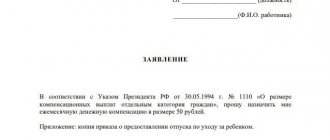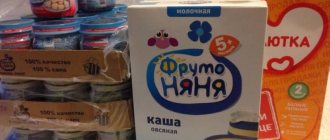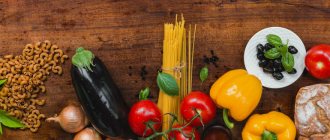Most of those who have heard of them consider them to be relics of Soviet times, while others believe that applying for “milk” for a child is an incredibly tedious procedure.
This is a big misconception; you just need to understand the rules for obtaining preferential products.
Dairy kitchen is a state social assistance for children, according to which food packages are issued.
In 2021 it was under threat of closure, but this did not happen.
Let's figure out who is entitled to child support in 2021, how to achieve it and what the rules for receiving a food basket are.
Closing of dairy kitchens
Fears about the closure of dairy kitchens in Moscow and the Moscow region have so far turned out to be in vain. The authorities are not saying anything specific, but dairy kitchens continue to operate, and moreover, the range of some products has increased.
Kitchens are attached to either children's clinics or outpatient clinics
What is dairy cuisine
Dairy cuisine is a measure of social support aimed at improving the nutrition of certain groups of the population. The concept of dairy cuisine is unofficial and is not used in legislation. Pregnant or breastfeeding women who have received a referral from the antenatal clinic will be able to take advantage of this measure. Or children whose mothers were given referrals by pediatricians.
The provision on the need for adequate nutrition for pregnant women and children is enshrined in the law “On the Fundamentals of Health Protection”. It states that the referral for such nutrition is made according to the doctor’s decision. This is subject to local laws. Local laws in some regions do not provide for dairy kitchens. They can be replaced with social benefit cards that give the right to purchase baby food products. You cannot cash out money from such cards. They can only be used to purchase certain food products for the child.
Who can receive food except the mother
In accordance with the law, pregnant and breastfeeding women can apply for this measure of social support. Children of different ages:
- Babies from birth to one year.
- Under 3 years of age, provided that the family has low-income status.
- Under 7 years of age, provided that the family has many children.
- Under 15 years of age, if the child has been assigned a disability.
The parents or guardians of the child are at the product delivery point. You must have with you documents confirming the right to receive it, a prescription issued by a doctor.
How does the free dairy kitchen work?
The free dairy kitchen starts its work early in the morning, usually from 6.30 until lunch.
In each specific region, opening and delivery hours must be clarified on site. Since baby food is a perishable product, operating and distribution times are strictly regulated. Dairy kitchens are attached to children's clinics. To obtain information about operating hours, you need to enter the clinic number and county in the search bar.
Important. Dairy kitchens can set certain days on which products will be issued. This is due to limited shelf life; baby food must be distributed within a short time after delivery. The day of issue may be shortened, and two hours may be allotted for receiving the products.
In which regions of Russia is the program provided?
Unfortunately, the social program is not valid in all regions. The program is active in a number of cities:
- Moscow and Moscow region.
- Ekaterinburg.
- Velikiy Novgorod.
- Volgograd.
- Bryansk.
- Kazan.
- Izhevsk
- Irkutsk
- Yoshkar-Ola.
- Kemerovo.
- Kostroma.
- Kirov.
- Nizhny Novgorod.
- Krasnoyarsk
- Kursk
- Moscow.
- Orenburg.
- Eagle.
- Ryazan.
- Penza.
- Permian.
- Samara.
- Ulyanovsk
- Ufa.
- Tambov.
- Chelyabinsk.
- Tyumen.
- Cheboksary.
Read also: Free medical services
Rules for providing dairy products may vary by region. The program is available through the State Services portal. In Moscow, the Mosreg website works in a similar way.
Important. Food packages may vary in composition depending on the region. In some regions, the dairy kitchen was replaced by the issuance of monetary compensation. You can find out whether monetary compensation is due by leaving a request on the State Services portal.
Changes from January 1, 2021
Registration rules, norms, addresses and work schedules in Moscow have nevertheless undergone some changes. Let's look at everything in order.
Changes in the food basket
Milk and juice remain unchanged products.
Only the number of products for children, women and nursing mothers varies.
New for 2021 was the distribution of food packages in corrugated boxes. Now pregnant women and children receive a variety of free children's food, because previously they could have been given several jars of one product.
What they give in the dairy kitchen:
- Liquid adaptive mixture and dry;
- Juice;
- Vegetable puree;
- Fruit puree;
- Meat puree;
- Children's cottage cheese;
- Milk;
- Children's kefir.
The food basket and distribution norms have expanded compared to last year, and sets packaged in paper containers have also been introduced, thanks to which you can diversify and balance the diet of newborn children.
A NEGATIVE change is the reduction in the volume of dairy products issued. According to last year's order, there was 50 grams per child. cottage cheese, this year – 20 grams. (0.6 kg per week). It turns out that the volume of some products was increased at the expense of others.
For whom help
This year the list of recipients has expanded. The Department of Health has added categories such as distribution to pregnant women, regardless of pregnancy status, and breastfeeding women.
The recipients remained unchanged:
- Infants and children up to 3 years of age;
- Up to 7 years old from large families;
- Children with disabilities under 18 years of age;
- Up to 15 years with chronic diseases;
- Nursing mothers;
- Women with a pregnancy period of 12 weeks or more.
The NEGATIVE side is that according to the order, milk should be given to a nursing mother after the 6th month from the birth of the child and provided that he is breastfed.
It turns out that only one person can count on social assistance - the mother or the child.
Dairy kitchen, addresses, Moscow: where the kitchens are located
The grocery list will be the same. To receive food, you need to write an application (using the sample) addressed to the head of the medical institution, and bring the necessary documents. Usually this is a passport page with a photo, a passport page indicating registration, and a child’s birth certificate (photocopy only).
You might be interested ==> Chernobyl category 2 food payments
Dairy standards: Moscow 2021 – table
- Two types of dry porridge (multi-cereal and rice);
- Fruit juice;
- Vegetable puree;
- Fruit puree;
- Meat-grows. puree;
- Meat puree;
- Cottage cheese;
- Milk;
- Kefirchik.
Help from milk distribution organizations can be used not only by pregnant women and parents of small children, but also by children with disabled status and families who are entitled to benefits as representatives of the low-income segment of the population. They can receive such assistance between the ages of 7 and 15 years. The food allowance provides for the provision of only milk in the amount of 18 liters per month.
In other appendices you can find a list of criteria by which the need for assistance is determined, and a table of norms for the distribution of milk nutrition for children and women. The same law contains an example of filling out an application and a doctor’s report form, which parents must submit to the milk distribution point.
What is required for pregnant and lactating women
Baby food suppliers may change every year, depending on government contracts with entrepreneurs. This year, the companies Agusha, Bellakta, and Belvita remained partners of the dairy kitchen program.
The composition of the sets is determined by local authorities. In this regard, the composition of food aid differs in each constituent entity of the Russian Federation. This point is regulated by local orders and regulations. They should be considered separately in order to understand what kind of help you can count on.
List of documents for registration
To register for food for a child, you need to contact your attending pediatrician, write an application and get a prescription from him.
It is provided exclusively at the place of registration.
List of documents for registration:
For pregnant women and nursing mothers:
- Application to the antenatal clinic;
- Registration in Moscow, or Moscow Region.
For children:
- Application at the children's clinic;
- Child's birth certificate;
- Medical insurance;
- Copies of documents confirming the identity of the parents.
Additional documents:
- Certificate of disability;
- Document on the status of the poor;
- Statement of health (should be given if special nutrition is required).
A NEGATIVE innovation is that according to the new rules, only persons registered in Moscow have the right to receive milk for free.
Previously, parents of children without registration could receive preferential meals with temporary registration; the new order does not mention this possibility.
There is also no mention of the right to receive a food package at the actual place of residence, and not at the registered one.
Who is entitled to
- Children under one year of age are given artificial or mixed feeding.
- Children aged 1-3 years.
- Children under 7 years old from large families.
- For disabled children.
- Children under 15 years of age with chronic diseases.
- Pregnant.
- Mothers of babies under 6 months old if the babies are breastfed.
What they give out in the dairy kitchen in 2021
In the Sverdlovsk region, all children from 8 months to 1 year can count on free food, while further provision of food is carried out taking into account their property status: at 1-2 years old - for children from low-income families who are not placed in kindergarten, at 2-3 years – for socially vulnerable children.
The recipe is presented at the dairy kitchen once a month, in return you are given a number through which you will receive food. Each distribution point sets its own rules, so in some places you will have to collect benefits yourself, while in others your husband or other relatives can do it for you.
Only your clinic can tell you about this. Most often, distribution points are located right next to the clinic or other medical institutions in your area. For the convenience of mothers, distribution points are open daily from 6:30 to 12:00.
You might be interested ==> Help for a young family from the state 2021 Tambov
How to get a prescription from a doctor for dairy cuisine in Moscow and Moscow Region
- application for assignment to a dairy kitchen addressed to the head of a medical organization/children's clinic;
- passport (original);
- compulsory medical insurance policy;
- certificate of registration at the child’s place of residence in Moscow;
- for children under guardianship - a document confirming the establishment of guardianship;
- for children over three years old - a document confirming that the child belongs to a preferential category.
Allowances for the purchase of food for pregnant women, nursing mothers and children under 3 years of age are issued by social protection authorities . In addition to a written statement of desire to receive regular financial assistance, a woman will need the following documents:
How often do you update the recipe?
The recipe has a certain expiration date. Most often, this is 1 month, but at the doctor’s discretion it can be longer.
- For pregnant and nursing mothers - once every 3 months;
- Children under 3 years old – once every 3 months;
- From 3 years – once every six months.
The prescription is issued for a period based on how soon the child needs repeated examinations by a doctor.
If you apply for a prescription before the 15th, the prescription will be issued for the current month, and after the 15th - for the next month.
Product List 2021
| Child category (months) | Products | Monthly portion (kg) | Quantity in container (kg) | Receipt schedule |
| 0-3 | Dry milk formula | 0.7 | 0.5 | 1/week |
| Liquid adapted mixture | 4.8 | 0.2 | 1/week | |
| 4 | + fruit puree and juice | 1 l each | Various | 1/week |
| 5 | + vegetable puree, porridge | 1.92 puree and 0.400 porridge | Various | 1/month |
| 6 | Dry and liquid milk formulas | 0.35 and 2.4 | Various | 1/week, except liquid mixture |
| Fruit and vegetable purees | 1 and 1.92 | |||
| Juice | 1.2 | |||
| Dry porridge | 0.4 | |||
| 7-08 | + cottage cheese, vegetable and meat puree | Cottage cheese – 0.6 Vegetables – 0.3 Meat puree – 0.56 | Various | 1/month |
| 9-12 | + kefir | 2 | Various | 1/month |
| 1-2 years | Fruit juice, milk, fruit puree, kefir, cottage cheese | Fruit juice – 2, | Juice – 0.2 each, milk – 0.2 each, | Juice, puree, milk – 1/month |
| milk – 2.4, puree – 0.8, | puree – 0.1 each, kefir – 0.2 each, cottage cheese – 0.05 each | cottage cheese and kefir – 1/week | ||
| kefir – 2.4, cottage cheese – 0.6 kg | ||||
| 2-3 years | Plus kg of juice and minus kg of milk | Milk – 2 kg, juice – 2.4 | Various | 1/month |
| Up to 7 | Milk | 1.8 | Various | 1/month |
| Up to 15 (Disabled children) | Milk | 1 | Various | 1/month |
| Pregnant | Milk and juice | 6 and 2.64 | 1 kg milk and 0.33 kg juice | 1/month |
| Nursing mothers | Milk and juice | 8 and 3.3 | 1 kg milk and 0.33 kg juice | 1/month |
The rules for issuing food packages are regulated by Appendix No. 4 to the order of the Moscow Department of Health dated April 6, 2016 No. 292 .
Dairy kitchens in Moscow and the Moscow region: features and differences
- Dry formulas (milk replacement, adaptive);
- Liquid mixtures (milk and fermented milk);
- Milk (cow);
- Kefir (children 3.2%);
- Curds (without additives in 50g packs);
- Fruit (clarified and also with pulp) juices (apple, pear, in packages);
- Fruit puree (apple, pear, peach, in jars);
- Vegetable puree (broccoli, pumpkin, zucchini in glass jars);
- Meat puree (in glass or iron jars);
- Meat and vegetable purees.
You might be interested ==> At what age can you buy energy drinks in Russia according to the 2021 law?
List and description of products offered in the set
In addition, pregnant women who are assigned to antenatal clinics can receive food at dairy kitchens in Moscow and the region. After the birth of a child, they are also given a set of products until the baby reaches six months of age. The basis for issuance is the conclusion issued by the doctor.
Applicants who received food for a child in kind or in cash in 2021 can receive a monthly cash payment for food starting in January 2021 when applying for its appointment within 6 months of 2021 (except if the child reaches the age of 3- x years).
certificate of provision of adequate nutrition - for a nursing mother whose child is breastfed and is observed in a medical organization not connected to the Unified Medical Information and Analytical System of the Moscow Region (hereinafter referred to as EMIAS MO) (for example, in a children's clinic belonging to the Department of Health of the city Moscow).
To receive a monthly cash payment for food, it is necessary, starting from January 1, 2021, to submit a corresponding application in your personal account on the Portal of state and municipal services in the Moscow region.
Every year, authorized employees of local governments formulate standards for issuing free products. In 2021, milk supply standards for children are calculated depending on their age, and for mothers - based on whether the woman is pregnant or breastfeeding.
Other documents may include medical reports confirming the child’s disability, chronic diseases, need for special nutrition, etc. In addition, if assistance is issued for a child from a large family, the applicant will also need to present a document confirming this fact.
Dairy kitchen design process
To register a dairy kitchen, first of all, a personal statement from the recipients is required. As already noted, recipients can be pregnant women, mothers of children on artificial nutrition, children under 7 years of age (from large families), disabled children, etc. Legal guardians, adoptive parents or trustees of a child also have the right to open a dairy kitchen. The application is written to the head physician of the medical institution where the pregnant woman or child is being observed.
- children under 1 year of age who are on artificial or combined nutrition;
- children aged 1 to 3 years;
- children from large families (up to 7 years old);
- disabled children;
- children under 15 years of age with severe chronic diseases;
- pregnant women;
- women who are breastfeeding until the child reaches 6 months of age.
- If a dairy kitchen is provided to a child without parental care, this right is transferred to his legal guardians or trustees.
Cash compensation for milk per child
The state also provides financial support for baby food for women who do not have access to dairy kitchens. The reason for this may be living in an area where they are simply not available, or there is no one to leave the baby with for a trip to buy food packages.
One way or another, there is an opportunity to get help in monetary terms, but it is not comparable either with store prices or with the quality of purchased products.
Regarding the amount of payment, it is disproportionately small.
Since the cost of the grocery set as calculated on January 1 by month is 50 rubles, the payment amount varies in different regions (from 100 to 700).
For this amount it is impossible to buy the same products in a supermarket.
Regarding the quality of products, according to state standards, baby food that is given to a child in dairy kitchens must be produced at manufacturing plants exclusively from natural milk, and not powdered milk, which increases the shelf life of the product.
Who should
Not all mothers are SATISFIED with the set or quantity of food in the dairy kitchen. Some people want MORE MILK or KEFIR instead of vegetable and fruit purees, others don’t like the brand of the food manufacturer. But we should not forget that the DAIRY KITCHEN is only additional state assistance to the child’s basic diet, and yet full responsibility for the child’s nutrition and his provision is the PARENTS’ TASK.
There is one important point in the work of dairy kitchens: their work is determined by local government. Simply put, the local legislative power itself determines what is needed in order to receive free baby food (what documents), what list of food products can be given out at the dairy kitchen, and who is entitled to baby food. It turns out that in one region the set of products and their quantity may differ significantly from the neighboring one. Nevertheless, general rules still exist.
26 Apr 2021 semeiadvo 585
Share this post
- Related Posts
- Transport tax rates in the Saratov region in 2021
- Payments for 3 children in the Murmansk region
- What is due to a single mother for the birth of 3 children in 2021?
- What is the punishment for the birth of 3 children in the Samara region?
Let's sum it up
Gone are the Soviet times, when in dairy kitchens you could only get milk and sour milk per child.
Now you can get a variety of food packages. Lack of awareness among citizens about the existence of a dairy kitchen can lead to a complete stop in its functioning.
Therefore, knowing about such a social program, do not neglect state support. Provide yourself and your baby with the necessary products for his growth and good health.
Issue norms
The decision on the standards for issuing social assistance is made by doctors who issue referrals to the dairy kitchen. This is done taking into account the age and condition of the person being sent.
In general, the products served in the dairy kitchen are divided into:
- vegetable and meat dishes in puree form;
- pasteurized milk;
- baby kefir;
- fruit juices and purees;
- curds.
All of the above is issued to the recipient only if there is a confirming direction.
Dairy kitchen issuance standards
The number and composition of the children's table depends on the age of the child:
- The mixture is given to infants up to 2 months, up to 5 liters weekly. After 3 months, up to 1 kg of mixture is released per month.
- Children from three months of age receive fruit juice, up to a liter per month. After six months - more than a liter.
- Dry baby porridge, 5 months - 400 g/month, from six months to 400 g/week.
- Vegetable and fruit puree, 5 months - up to 1 kg/month, from six months - up to 2 kg/month.
An example is given for Moscow. The quantitative ratio of allocated nutrition is established according to age by the Health Departments in the regions. Therefore, the children's table in the regions may be different.
In some regions, the issuance of food packages is being replaced by social cards, which can be used to pay in stores for the purchase of food for the child. You won't be able to cash out this money. You can only pay with them for certain products.
Read also: Rehabilitation and habilitation programs for people with disabilities
If violations of the quality of the product are detected, complaints can be sent to the Department of Health.







